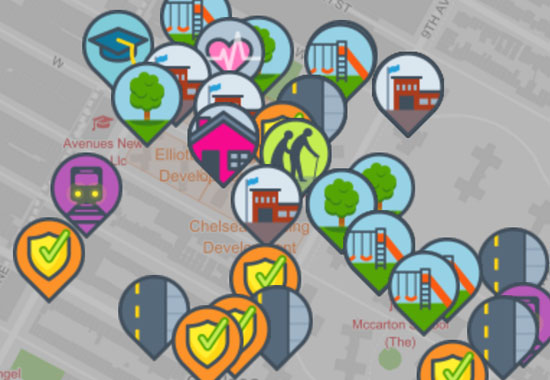The report was commissioned by the Council and proposes a dynamic, time-based charge on delivery vehicles to reduce congestion and incentivize more efficient deliveries
New York, NY – Today, transportation and traffic analyst Charles Komanoff released Taming New York City’s E-Delivery Gridlock, a report to the New York City Council that proposes charging package delivery vehicles (such as those operated by Amazon, UPS and FedEx) a per-minute charge for the time they occupy the City’s most congested streets and curb spaces. The report estimates that travel delays caused by delivery trucks occupying road and curb space while delivering e-commerce parcels cost New Yorkers time worth more than $400 million annually.
The delivery vehicle charges would initially apply in Manhattan and adjacent sections of Brooklyn, Queens and the Bronx with the city’s highest population and traffic densities. By the report’s estimates, these areas account for slightly more than half of all e-commerce deliveries to New York City residences.
The proposed charges would be levied on the delivery vehicles carrying e-commerce parcels rather than on individual packages or specific customers or delivery destinations. In order to best address the vehicles’ congestion causation, charges would vary by geographic area, by time of day and day of week, and by the vehicle’s physical size.
The release of the report coincides with the Council’s vote on the first round of bills in its package of legislation encouraging smart, safe and sustainable deliveries. The bills, sponsored by Speaker Johnson and Council Members Reynoso and Powers, would create a pilot program for sustainable micro-distribution centers, codify new regulations around spaces for truck loading and unloading to ensure they are not blocked by construction or placard parking, and dramatically expand the amount of curb space dedicated to loading zones citywide.
The Council commissioned Komanoff to conduct an evaluation of the feasibility and benefits of a new policy charging vehicles engaged in delivering e-commerce parcels for the time they occupy public streets. This policy would have the goal of addressing negative externalities inflicted on the City by inefficient e-commerce delivery trips – including traffic congestion, air pollution and carbon emissions, and occupation of curb space needed for other commercial activities.
The policy proposed by the report would build on Komanoff’s proposal to charge ride-hail companies (such as Lyft, Uber and Via) a per-minute charge on empty vehicle “cruising” time in the Manhattan taxi zone, extending from 96th street to the Battery. Like the FHV cruising charge, this policy would work in concert with the New York State-mandated congestion pricing program.
The charges proposed by the report would vary to reflect variations in congestion causation attributable to the vehicles. Rates would range from as high as around one dollar per minute for a delivery van in the Manhattan Central Business District during mid-day on a weekday, to as low as two cents per minute for overnight deliveries in Brooklyn, Queens and the Bronx.
Among the benefits of such a policy, Komanoff estimates that charging e-commerce delivery vehicles will lead to a “right sizing” of packages and a reduction in vehicle trips, resulting in mitigated traffic congestion, reduced packaging waste, shifts to using “delivery centers” for package pickup, switches to “off-peak” deliveries and increased patronage of brick and mortar businesses. The proposal would not charge for deliveries by human powered devices, encouraging companies to further shift toward sustainable last-mile delivery practices.
The report includes detailed methodology underlying the charging proposal, and presents assessments of potential consequences and interactions with existing policies.
“I want to thank Charles Komanoff for another important report with innovative ideas for addressing New York’s transportation issues. Our City is facing worsening congestion on our streets, which causes increasingly slower average bus speeds and contributes to air pollution. This proposal to charge package delivery vehicles for the time they spend on the curb and on the most congested streets could help significantly reduce gridlock and improve transportation efficiency in NYC,” said NYC Council Speaker Corey Johnson. “How we use our City’s streets has to keep up with new developments like the huge increase of e-commerce deliveries in the last decade, and I am excited for the public conversation to come around this and other proposals to help us manage new street usage patterns in a sustainable way for years to come.”
“E-commerce’s usurpation of our streets has gone unchecked for too long,” Komanoff adds. “Charging e-commerce delivery vehicles can help make our city more sustainable, affordable and vibrant.”

